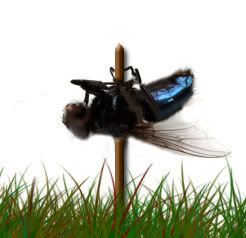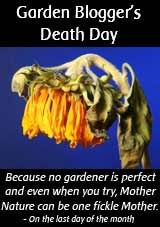1. Don’t start your garden during the hardest planting season in your area. Pick the easiest season for growing to take the plunge. For us here in Florida, the hardest time of year is July. We started our garden in July, which is also smack-dab in the middle of hurricane season. Not a good idea. I've heard it's a lot easier in the Fall and Spring. We were so gung-ho to get started that we couldn't wait until Fall, so we started in July with catastrophic effects. In hindsight I should have chucked a seed in a pot to get me through the summer.
2. Get your soil tested by the pro's. We didn't get our soil tested before we planted. Farmer B and I figured our soil looked great. We eventually used a home testing kit, but we had a hard time interpreting the results. You should go to your local extension office and get them to test your soil and tell you what needs to be done. We still have that on our list of things to do.
3. Pull up and remove all sod/grass from your garden. We tilled ours in because plenty of Farmer B's man-friends told him that's the way to go. Well that IS the way to go if you want to grow a lot of grass in your garden. If you tear it up and remove it from your garden, you have less of a chance of your prize crop being grass. Farmer B and my dad spent about 2 years trying to grow grass in our yard with no avail. Now we're growing grass in the garden at an amazing rate.
4. Have a fertilization plan. We're still working on this one. When a lot of our initial plants died and I went to our local nursery to ask for advice, the guy who worked there told us that our plants were probably starving because we didn't feed them. I think I assumed that if you had fertilizer in your soil that you were set. Apparently, much like children, you have to feed plants from time to time. We do liquid Miracle Gro in a watering can about every 10 days now. Everything is still dying, but I think I can cross starvation off the list of reasons why now. Maybe over-feeding can replace starvation?
5. Have a bug killing plan.
 We're so far off on this one. Something is eating our plants and we don't know what. We don't know what to spray on them. We don't know what's eating them. I wish we had figured out more about pest control before planting everything. You should know how to kill the enemy before starting a garden. We're still considering our backup plan, which is to follow in Vlad the Impaler's steps and spear a bug on a toothpick and leave it in the garden as a warning for what will happen to future bugs.
We're so far off on this one. Something is eating our plants and we don't know what. We don't know what to spray on them. We don't know what's eating them. I wish we had figured out more about pest control before planting everything. You should know how to kill the enemy before starting a garden. We're still considering our backup plan, which is to follow in Vlad the Impaler's steps and spear a bug on a toothpick and leave it in the garden as a warning for what will happen to future bugs.6. Plant flowers to attract pollinating insects if you have no other flowers around. We have close to 2 acres and have no flowers except for the ones on our blooming vegetables. So we have no bees to pollinate our plants that require actual pollination. We planted sunflowers and consequently attracted bees. So if you have nothing to attract bees, you ought to plant something to attract them if anything you plant needs insect pollination. If you want to pollinate your plants by hand, pull up a chair and read about the seedy world of hand-pollination. It's steamier than a dime store romance novel.
7. Join a gardening forum in your area. If you are clueless, you need to rely on others for support. I'm a fan of GardenWeb. You can go there and find your area of the country and read posts from others in your neck of the woods for help and advice. I feel guilty about using them so much and not being able to provide help to others, but maybe one day I'll gain enough knowledge to pass on what I've learned.
8. Start seeds and seedlings your first time planting. I'm glad we did both. This was something we actually did right. And do NOT plant all the seeds in the little packet right away. Hold about 1/4 of the seeds back. If you have a catastrophic failure, like we did, you'll have some leftover seeds to bung in the ground again. And if things start to take root, you can plant that final 1/4 a little late to have a fall-back crop. And planting some seedlings will make you feel better when you get the instant gratification of seeing something green growing in the garden. I needed to see green when I looked out there. An all-brown, all-seed garden would have given me anxiety issues.
9. Play close attention to growing schedules. We planted some things out of season (accidentally) and it just doesn't work that well. Find out your zone and what plants you're supposed to plant in what months and stick to it. Oddly enough we planted carrots about 4 months out of season and they're still going strong. Go figure.
10. Buy books. We bought a Florida Gardening Book and an Organic Gardening Book. Both have been invaluable. The web is great for info, but there's something to be said about sitting in your garden with the gardening book and comparing photos in the book to your half-dead plants and trying to solve the mystery of what's killing them.




















1 comment:
I think the advice in this post is excellent....Thanks for always finding something to blog about, and contributing a bit of humor to each. It's good reading....I'll get y'all some pea photos this weekend.....
Post a Comment